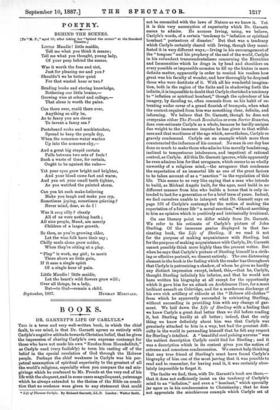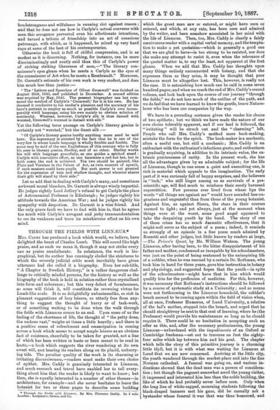BOOKS.
DR. GARNETT'S LIFE OF CARLYLE.* Tuts is a terse and very well-written book, in which the chief fault, to our mind, is that Dr. Garnett agrees so entirely with Carlyle's negative attitude towards Christian belief, that he gives the impression of sharing Carlyle's own supreme contempt for those who have not made his own " Exodus from Houndsditch," as Carlyle used (very foolishly) to term his casting off of the belief in the special revelation of God through the Hebrew people. Perhaps the chief weakness in Carlyle was his per- petual assumption of spiritual superiority to the greatest of all th►world's religions, especially when you compare the sad mis- givings which he confessed to Mr. Fronde at the very end of his life with the eloquent, and in some cases magniloquent, patronage which he always extended to the theism of the Bible on condi- tion that no credence were given to any statement that could
• Life qf Thome.. Carlyle. By Richard Garnett, LL.D. London: Walter B00%
not be reconciled with the laws of Nature as we know it. Yet it is this very assumption of superiority which Dr. Garnett. seems to admire. He accuses Irving, rising, we believe, Carlyle's words, of a certain ' tendency to "inflation or spiritual bombast" portentous of disaster.' But that was a tendency which Carlyle certainly shared with Irving, though they mani- fested it in very different ways,—Irving in his encouragement of the " tongues " and his prophecy of the end of the world, Carlyle in his redundant transcendentalisms concerning the Eternities and Immensities which lie drags in by head and shoulders on every possible or impossible occasion to fill up the hiatus in more definite matter, apparently in order to remind his readers how great was his faculty of wonder, and how thoroughly he despised those who were destitute of it. With all his wonderful imagina- tion, both in the region of the finite and in shadowing forth the infinite, it is impossible to doubt that Carlyle cherished a tendency to " inflation or spiritual bombast," though the splendour of hie imagery, by dazzling us, often conceals from tie his habit of re- treating under cover of a grand flourish of trumpets, when what the context required from him was something clear, definite, and informing. We believe that Dr. Garnett, though he does not overpraise either The French Revolution or even Sartor Resartue, does over-estimate Carlyle as a whole, because he hardly assigns due weight to the immense impulse he has given to that wilful- ness and that wordiness of the ago which, nevertheless, Carlyle so gravely condemned. Carlyle set an example which more than counteracted the influence of his counsel. No man in our day has done so much to make those who admire him morally headstrong, inclined to tempestuous intolerance, and impatient of rational control, as Carlyle. All this Dr. Garnett ignores, while apparently he even admires him for that arrogance, which seems to as wholly unworthy of a religious mind,—the arrogance that condemns the expectation of an immortal life as one of the great factors to be taken account of as a " sanction " in the regulation of this life. This seems to us very like saying that a man who intends to build, as Michael Angelo built, for the ages, need build in no different manner from him who builds a house that is only in- tended to last for a generation or for a brief term of years. Indeed, we find ourselves unable to interpret what Dr. Garnett says on page 168 of Carlyle's contempt for the notion of making the expectation of a future life" a moral sanction," without ascribing to him an opinion which is positively and intrinsically irrational.
On one literary point we differ widely from Dr. Garnett. We refer to his estimate of Carlyle's picture of John Sterling. Of the immense genius displayed in that fas- cinating book, the Life of Sterling, if we read it not for the purpose of making acquaintance with Sterling, but for the purpose of making acquaintance with Carlyle, Dr. Garnett cannot possibly think more highly than the present writer. But when he says that Carlyle's picture of Sterling himself is a strik- ing or effective portrait, we dissent entirely. The one distressing element in the book is the feeling which the reader has throughout that Carlyle is patronising a shadow, of whom he gives us hardly any distinct impression except, indeed, this,—that he, Carlyle, thought Sterling infinitely his inferior, and that he would not have written his biography at all except for the opportunity which it gave him for an attack on Archdeacon Hare, for a most brilliant assault on Coleridge, and for a murderous discharge of his own rich artillery of ridicule at the " Hebrew old-clothes " from which he apparently succeeded in extricating Sterling„ without succeeding in providing him with any change of gar- ment. We laid down the Life of Sterling with a feeling that we knew Carlyle a great deal better than we did before reading it, but Sterling hardly at all better ; indeed, that the only thing we know definitely about him was that Carlyle was genuinely attached to him in a way, but had the greatest diffi- culty in the world in persuading himself that he felt any respect for Sterling's intellect. A " beautiful soul pulsing auroras " was the noblest description Carlyle could find for Sterling ; and it was a description which in its context gives you the notion of extreme and conscious condescension. We cannot help thinking that any true friend of Sterling's must have found Carlyle's. biography of him one of the most jarring that it was possible to read and to remember, for having read it, it was certainly abso- lutely impossible to forget it.
The faults we find, then, with Dr. Garnett's book are these,— that it does not sufficiently insist on the tendency of Carlyle's mind to an "inflation," and even a " bombast," which specially jar upon us in his condescension to Christianity ; that he does not appreciate the mischievous example which Carlyle set of headstrongness and wilfulness in running riot against reason ; and that he does not see how in Carlyle's actual converse with men this arrogance perverted even his affectionate intentions, and turned a tribute of friendship into an act of conscious patronage, with which, as it happened, he mixed up very hard raps at some of the best of his contemporaries.
Otherwise the book is full of skilful compression, and is as modest as it is discerning. Nothing, for instance, can be more discriminatingly and neatly said than this of Carlyle's power of etching striking likenesses of men,—" The literary con- noisseur's eyes gleam when he meets a Carlyle as the eyes of the connoisseur of Art when he meets a Rembrandt." Moreover, Dr. Garnett's estimate of his own work is very modest, and does him much less than justice:— " The ' Letters and Speeches of Oliver Cromwell' was finished on August 26th, 1845, and published in December. A second edition was required by May, 1846. The present biographer can but com- mend the method of Carlyle'a ' Cromwell,' for it is his own. He has deemed it conducive to his reader's pleasure and the accuracy of his hero's portrait to employ as much as possible Carlyle's own incom- parably vivid language, using his own mainly to obviate solution of continuity. Whereas, however, Carlyle's silk is them darned with worsted, Cromwell's worsted is darned with silk."
Yet the following terse passage on Carlyle's literary genius is certainly not " worsted," but the finest silk :-
" Of Carlyle's literary genius hardly anything more need be said here. His supremacy is attested by the fact that be is one of the very few in whose hands language is wholly flexible and fusible. The eame may be said of the one Englishman of this century who is folly his peer in literary genius, Shelley, and of no other. Shelley works his will with language gracefully, as one guides a spirited steed Carlyle with convulsive effort, as one hammers a red-hot bar, but in both oases the end is achieved. The two should be painted, like Plato and Vernlam in the Palace of Art, as twin masters of speech, if such masters could have pupils. But such power is not granted for the expression of vain and shallow thought, and whoever shares their gift will stand by their side."
Let us add that in dealing with Carlyle's many, and sometimes awkward moral blunders, Dr. Garnett is always wisely impartial He judges rightly Lord Jeffrey's refusal to get Carlyle the place of Astronomical Professor in Edinburgh ; he judges rightly his attitude towards the American War ; and he judges rightly his sympathy with despotism. Dr. Garnett is a wise friend. And the only grave fault we have to find with him is, that he agrees too much with Carlyle's arrogant and jerky transcendentalism to see its weakness and trace its mischievous effect on his own mind.



































 Previous page
Previous page